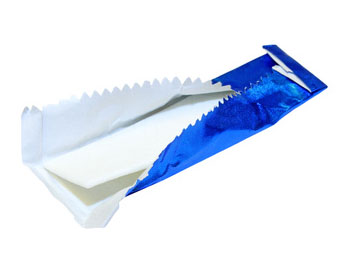Does chewing gum help you lose weight or burn fat? This question has been investigated by scientists before and chewing gum as a weight loss strategy even got some mainstream pub thanks to The Biggest Loser. The idea looked plausible, even promising, but a new study has shed a different light on the subject. Researchers at the University of Alabama conducted an 8-week randomized controlled trial and the results were published in the March 2012 issue of the journal Obesity. Read on to see what they discovered…
 There are probably two types of people reading this article. One is the person thinking, “Yeah right – chew gum to lose weight? That’s stupid, how could that ever work? How gimmicky can you get? And why would any University even bother to study this?”
There are probably two types of people reading this article. One is the person thinking, “Yeah right – chew gum to lose weight? That’s stupid, how could that ever work? How gimmicky can you get? And why would any University even bother to study this?”
The other is thinking, “Actually it could be possible. I mean, what if you got a hankering for a big chewy Cinnabon, but instead you said, ‘Nah, I’ll just chew sugar free gum instead – at least I get to taste something.’ If that happened, you successfully dodged an 800 calorie calorie-bomb! That’s big, right?”
“Or what if chewing gum suppressed your appetite? Or maybe… and this might seem a bit far fetched at first, but what if you chewed gum all day long and that actually added to the day’s Non Exercise Activity Thermogenesis (NEAT)? Well, why not? Obesity researchers list “fidgeting” under NEAT, so why not chewing?”
So… I think we could concede that it’s not so ridiculous after all that so many people ask about this and in fact, this new study was undertaken because some suggestions were made in past research that there was something to it.
James Levine, the top authority on NEAT, published an article in the New England Journal of Medicine back in 1999 that examined the calories burned in chewing gum (I’m not kidding, it’s cited in the references below). NEAT is actually a very significant and extremely overlooked contributor to daily calorie expenditure. Most people (unless they use a Bodybugg or similar device) are shocked when they find out how much little things each day can add up over time. But could gum chewing add up to anything worth talking about?
Levine thought so. He reported an increase of 11 +/- 3 kcal per hour increase above baseline. His paper concluded:
“Gum chewing is sufficiently exothermic that if a person chewed gum during waking hours and changed no other components of energy balance, a yearly loss of more than 5 kg of body fat might be anticipated. Chewing of calorie-free gum can be readily carried out throughout the day, and its potential effect on energy balance should not be discounted.”
Holy bubble yum batman! 5 kg of body fat lost per year?
That is indeed what they estimated, but hold on a minute, don’t soil yourself with excitement just yet. First of all, that would assume you’d be chewing all the time. But more important, all they did was measure energy expenditure of chewing for an hour. They didn’t even measure weight loss or body composition. They simply extrapolated the hourly burn that was actually measured in the short term to what it would theoretically add up to in a year.
…and THAT happens a LOT in weight loss research, and…. unfortunately… entire (fad diet) books have been written based on similar hypotheses: one little idea pulled from a study where they never ever measured body fat or change in weight over the long term!
So back to the recent study. This one was a randomized controlled trial (RCT), which is considered the gold standard for research studies. Up until now, there were no RCT’s about chewing gum, so all we had was speculation about what might happen to weight loss and body fat if the gum chewing were continued for an extended period.
James Shikany and his team at the University of Alabama conducted the 8-week RCT in 201 overweight and obese adults to test the hypothesis that chewing gum (along with receiving printed material on good nutrition) for a minimum of 90 minutes a day would lead to greater weight loss than receiving printed nutrition information only.
The compliance to the gum chewing was high (>95%), which you’d well assume – I mean, it’s tough to get people to jog 30 minutes a day for 8 weeks, but pop a stick of gum in your mouth and chew for 90 minutes – no problem, right?
The researchers measured for body weight as the primary outcome, with BMI, waist circumference and blood pressure as secondary outcomes. I always like to see body composition (fat vs muscle) measured, but oh well.
The results:
“A regular schedule of gum chewing and the provision of nutrition information did not result in significant differential changes in body weight, other anthropometric measures, or blood pressure compared to a nutrition information only group over 8 weeks.”
There’s a big takeaway from this study and I already revealed it, but let me re-emphasize and re-phrase it. It’s not even just about chewing gum, it’s bigger than that.
The main take away (unrelated to gum per se) is that there are stacks of trials showing no effect of a proposed weight loss strategy where previous research had suggested it held promise.
Lesson: Wait for the RCT / long term research before you get too excited.
Another lesson: Wait for more than one study (buyer beware if you’re an early adopter in the shady weight loss market).
The researchers hammered this point home and said, “This reinforces the value of basing conclusions on RCT’s addressing weight loss per se as opposed to experiments on perceived intermediary variables such as appetite, food intake or aspects of energy expenditure.”
I see so many people get fooled by marketers waving research studies to sell their “magic diets” and “magic pills” that I want to translate this for you with another example…
You’re surfing the web and you see an ad for “Weird Chinese Tea Burns Fat.” So you click on the link and get sent to a pitch page and lo and behold, not only is it filled with amazing before and after pictures, you actually get a citation to the study that PROVES this “Weird tea” burns fat. You go to pub med. There it is! A study “proves” it! You’re sold… Hey, it’s based on research! You’re convinced!
Well… while the study really did happen and it really did get published in a reputable peer reviewed journal, what they neglected to tell you was that it was a two hour study! They found an increase in energy expenditure (increased thermogenesis) for 120 minutes. They didn’t weigh the subjects. They didn’t measure their body fat. They didn’t chart their progress over time. They have NO IDEA if the “magical fat burning tea” caused actual weight loss!
Two final notes that are both interesting:
First, The Wrigley Science Institute funded the study. Yes, as is Wrigley gum. The gum for the study was provided by the Wm Wrigley Jr. Company. I guess they weren’t too pleased with the outcome. (On a slight tangent, I often find it interesting how most people assume that if a study is corporate sponsored, the results will always turn out in favor of the sponsor… and how if the results don’t turn out the way a person hoped for, if it is corporate sponsored, it’s necessarily biased).
Second, the subjects in this study were surveyed at the end. There was moderate agreement among participants with statements that chewing gum helped reduce cravings for snacks, helped participants stay on their diets, and reduced eating after meals and late-night snacking. There was also moderate agreement with the statement that participants would recommend chewing gum as a tool to help people lose weight. Many people, apparently even this test group, seem to feel that chewing gum does in fact help them. (On the other hand, I know people who say chewing gum just makes them hungrier or actually triggers cravings).
Is it possible that gum chewing might help some people lose weight? Sure, it’s possible – if you chew sugar-free gum and it does actually prevent you from eating , drinking sweetened beverages or it helps stave off a craving or emotional urge for food… and if those effects hold up over time.
But… it didn’t help the large group of subjects in this controlled study… where they DID measure body weight change over time.
I’m sure some people think this is a trite subject, but I’ve been asked about this a lot over the years and I think there are some important lessons here beyond answering the question about chewing gum for weight loss.
-Tom Venuto
PS. I’ve chewed sugar free gum when I was preparing for bodybuilding competition and the diet was very strict, though I did it to have something sweet – I never thought of it as “burning fat” or helping me get leaner per se. What do you think? Helps? Hurts? No Difference? Dumb study?
References
1.Randomized Controlled Trial of Chewing Gum for Weight Loss. Shikany JM, et al, Obesity 20: 547-552. University of Alabama.
2. The energy expended in chewing gum. Levine J, 341: 2100. New England Journal of Medicine. 2007. Mayo Clinic, Rochester MN.
3. Short term effects of chewing gum on snack intake and appetite. Hetherington MM, Appetite, 48(3), 397-401, 2007. Glasgow Caledonian University.
About Tom Venuto

Subscribe to the Burn the Fat weekly newsletter and get my ebook, "The 20 Best Fat-Burning, Muscle-Building Recipes Of All Time" FREE!
Your email is safe with me!






Chewing gums suppresses my appetite or at the very least, makes it easier to manage.
I will chew Orbit gum daily, which is sugar-free, but nonetheless has a pretty strong flavor this helps to quell my cravings for something sweet.
Plus, this satisfies my need for oral fixation. It’s better to be chomping on gum then wolfing down some high calorie fare.
I’m with Scott. When I get the craving mid-afternoon (and it’s not yet snack time — I have reminders built into Outlook) having a stick of gum and some water seems to break the need without adding lots of calories. There’s lots of zero or very low calorie (5cal or less) gums with great flavors. Does it burn fat? LOL — probably not, but if it keeps me away from the garbage in the vending machine, I’ll take it.
Thanks for pointing out to people once again – the baloney out there! You talk a lot of sense Tom!
Thanks for the great article, Tom.
Without being careful, it’s so easy to read a claim that some fad or gimmick helps us lose weight, then see a misinterpreted study that seems to substantiate it, and take that claim as truth.
Pseudo-science is (unfortunately) rampant in the weight-loss community, and it’s nice to have you discuss how to avoid falling victim to it.
I love chewing gum, know that it helps curb my hunger cravings, but don’t include it as part of my exercise routine :)
Well, I chew gum very occasionally when I want something sweet and I don’t have a piece of fruit or am not actually hungry BUT for me it increases appetite. When you think about it when you chew it’s a signal to your stomach that food is on the way! Can’t be good for digestion long term either?
[…] Tom Venuto – does Chewing Sugar Free Gum all day help burn calories to lose weight? Although it is exercise (moving your jaw) apparently […]
Yeah I’m with you Andrew – chewing gum makes me really hungry in the long run, although does initially provide me with some satisfaction to be chomping on something!
I think this could be a first step for people who are just starting to get interested in their personal health. I really liked the idea of chewing gum instead of eating a high calorie snack. I always heard of people using this to curve their nicotine problems, but never implemented to avoid eating snacks. I really like the concept of substitution.
I suppose it’s all in the mind. I do agree that chewing gum help you reduce craving, it’s probably because you are chewing and there is a certain flavor gums have.
Tom, very interesting study you blogged about. This was new stuff to me about how some people felt one could lose a bit of weight by chewing gum. I guess we can sometimes fall into the habit of looking for quick and easy fixes instead of being committed to doing the hard work it takes to achieve goals. Thanks for sharing and for the reminder to learn to be savvy researchers!
Chewing gum in the long the run makes me not hungry. I don’t know why if it’s because I have many gases inside my stomach already due to chewing or what. LOL. But yea, chewing gum does different effects on everyone.
[…] I mentioned calories burned by chewing above. A lot has been made, in books and articles, about a study published in the New England Journal of Medicine back in 2007 7, usually given as "a doctor from the Mayo Clinic," which found that chewing gum burns 11 calories per hour. Eh, so that's a lot of chewing, and I have TMJ problems, so I had to give up gum. But, it's not like there is nothing to this. You see, there are more things to consider besides just the calories burned by the chewing. Maybe you avoid a high calorie snack. Or maybe there is an appetite suppression, or it contributes to resting energy expenditure in some way. Tom Venuto blogged about this, and brought up another study that dove further, so you can find out more in Does Chewing Gum Help You Lose Weight? […]